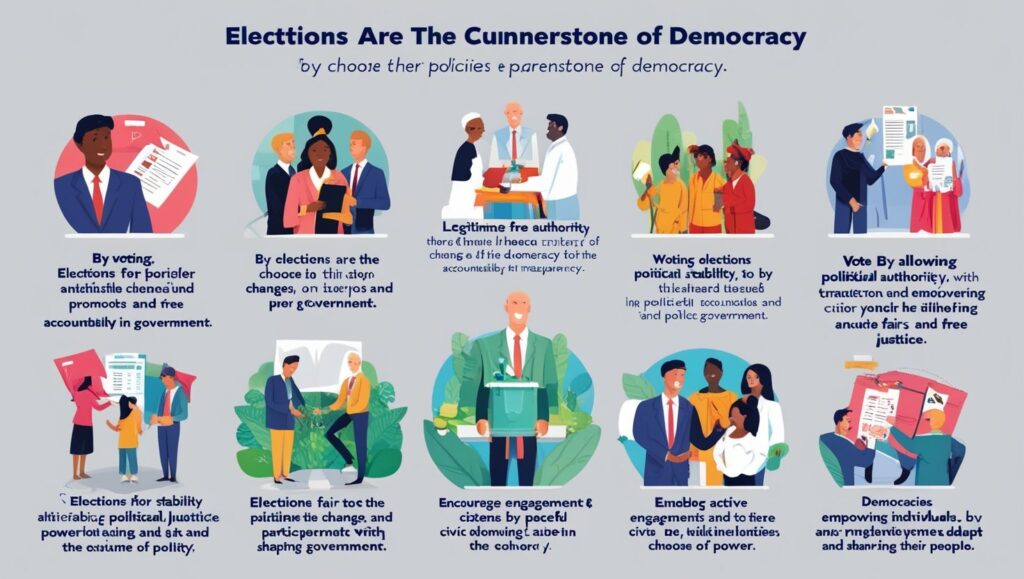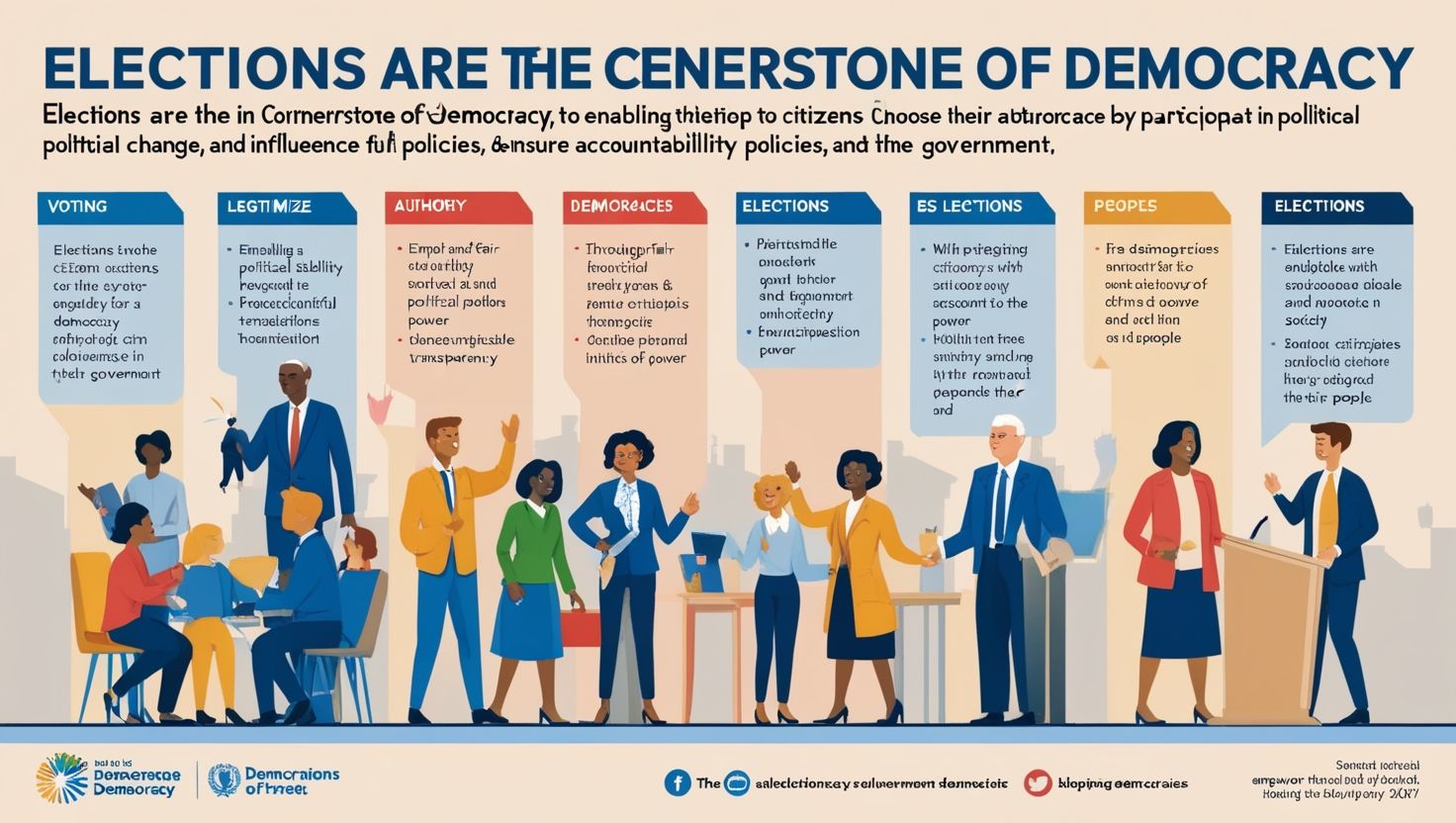Introduction
The Role of Elections in a Democratic Society, Elections serve as the foundation of democracy, a form of government where citizens exercise power either directly or through elected representatives. Through elections, individuals express their preferences, select leaders, and hold officials accountable. In a democratic society, the electoral process is a means of reinforcing citizen engagement, ensuring the legitimacy of leadership, and fostering political stability. This article explores the essential role of elections in a democratic society, detailing how they sustain representation, enhance government legitimacy, ensure accountability, promote peaceful transitions, and encourage political awareness and engagement.
1. Foundation of Representation
At the heart of democracy is the concept of representation—the idea that leaders should embody the will and interests of the people they serve. Elections empower citizens to choose representatives who align with their values and vision for society. By voting, citizens select individuals who will advocate on their behalf, make decisions that reflect their needs, and develop policies that aim to improve the common good.
Representative democracy built on the understanding that every citizen’s voice matters, and elections ensure that a diverse array of opinions and perspectives contribute to governance. For representation to be fair, elections must be conducted transparently and inclusively, ensuring that all eligible citizens have the opportunity to participate. In doing so, elections lay the groundwork for a society where policies reflect the public’s aspirations grounded in broad support, further legitimizing democratic institutions.
2. Legitimization of Government Authority
In a democracy, the legitimacy of governmental power stems directly from the people’s will, primarily expressed through elections. When citizens vote, they endorse a system of governance and provide consent to those who will wield authority on their behalf. This process is crucial because it establishes the moral and political authority of leaders, allowing them to enact policies, manage resources, and make decisions on behalf of the populace.
Elections also serve as a safeguard against authoritarianism by ensuring that those in power remain answerable to the electorate. Leaders who gain authority without public consent often face resistance and may lack credibility in the eyes of citizens. The peaceful transfer of power through elections reinforces public trust and signals a stable, functioning democracy where leadership reflects the current values of society.
Case Study: Legitimacy in Action
In many democratic nations, elections have played a pivotal role in legitimizing governments during periods of social transition. For instance, South Africa’s first multiracial elections in 1994 symbolized a break from apartheid and marked the beginning of a democratic era where all citizens’ voices were heard. The government led by Nelson Mandela was recognized globally for its legitimacy, built on the foundation of fair and inclusive elections.
3. Promotion of Political Accountability
A fundamental advantage of democratic elections is the ability they provide citizens to hold leaders accountable. By voting in regular intervals, citizens can either re-elect those who fulfill their responsibilities or replace those who fail to meet public expectations. Accountability is central to democracy, as it ensures that leaders work in the best interests of their constituents, knowing they can be removed from office if they don’t.
Electoral competition also fosters transparency and responsiveness. Candidates often articulate specific policies during campaigns to attract voters, and after being elected, they are held to these promises. This mechanism encourages leaders to act with integrity, address citizens’ concerns, and remain transparent about their actions, knowing their continued tenure depends on public approval.
Example: Accountability through Elections
An example of electoral accountability can be seen in countries where corruption has been a recurring issue. In India, for instance, a public push against corruption in recent decades has led to the ousting of officials perceived as ineffective or corrupt in subsequent elections. The use of elections to hold politicians accountable has created a political climate where public officials are more cautious and citizen-focused in their governance.
4. Facilitation of Political Change and Innovation
In addition to enabling citizens to voice their discontent, elections allow for peaceful and structured political change. Rather than resorting to violent protests or coups, people in democratic societies can express their desire for change through the ballot box. This feature of elections makes democracy a stabilizing force, as it provides a legitimate and organized means of transferring power and adjusting political representation as societal needs evolve.
Elections also encourage political innovation. Candidates with new ideas, policies, or approaches can present these to the electorate and, if supported, bring fresh perspectives into governance. This dynamism is vital for a healthy democracy, as it fosters an environment where a diversity of ideas can flourish, allowing governments to remain adaptive and responsive to changing societal values.
Political Change: The U.S. Election of 2008
The 2008 U.S. presidential election exemplifies how elections can serve as agents of change. Barack Obama’s election represented a shift towards progressive values and brought attention to issues such as healthcare reform and climate change. His administration’s policies reflected the electorate’s demand for a fresh approach, demonstrating how elections allow a society to recalibrate its direction through democratic means.

5. Encouragement of Civic Engagement and Political Awareness
Elections are instrumental in promoting civic engagement, political participation, and awareness among citizens. Campaigns, debates, and media coverage expose citizens to critical political and social issues, encouraging them to think deeply about the type of society they want. This engagement not only empowers individuals to make informed voting choices but also fosters a culture of active citizenship.
Through participation in elections, citizens become more invested in their society’s future, as they realize their role in shaping governance. The electoral process strengthens democracy by creating a well-informed populace that actively contributes to national discourse. Moreover, campaigns and debates serve as educational tools, enhancing political literacy and helping citizens understand the impact of their decisions on societal well-being.
Enhancing Political Awareness: The Role of Media and Debates
Media coverage and public debates play an essential role in educating citizens about candidates and policies. For instance, televised debates in democratic nations like the United States have historically drawn large audiences, providing voters with direct insights into candidates’ platforms. The dissemination of information through diverse media outlets also fosters critical thinking, enabling voters to evaluate candidates critically.
Conclusion
The Role of Elections in a Democratic Society, Elections form the cornerstone of democratic societies, sustaining representation, reinforcing the legitimacy of government, promoting accountability, facilitating change, and enhancing civic engagement. They create a stable platform where citizens can exercise their right to choose leaders, demand transparency, and foster political renewal. For democracy to thrive, it is essential to safeguard the integrity of elections and promote widespread political awareness. When citizens are informed, engaged, and empowered to participate, democracy becomes a resilient, adaptive, and just system capable of addressing societal needs.
References
- Dahl, R. A. (1998). On Democracy. Yale University Press.
- Lipset, S. M. (1959). “Some Social Requisites of Democracy: Economic Development and Political Legitimacy.” American Political Science Review, 53(1), 69-105.
- Diamond, L., & Morlino, L. (2004). “The Quality of Democracy.” Journal of Democracy, 15(4), 20-31.
- Sen, A. (1999). Development as Freedom. Oxford University Press.
- Norris, P. (2014). Why Electoral Integrity Matters. Cambridge University Press.

8 thoughts on “The Role of Elections in a Democratic Society”
Comments are closed.